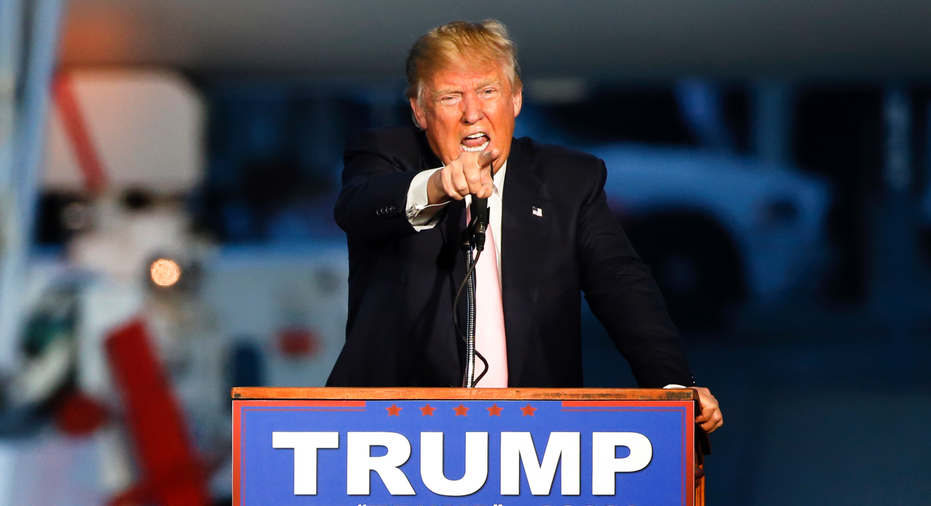In GM country, workers aren't abandoning Trump - so far
In this Nov. 28, 2018 photo, Tom Wolikow, right, holds his daughter Annabella alongside his father John, left, at their home in Warren, Ohio. It was working-class voters who bucked the area's history as a Democratic stronghold and backed Donald Trump in 2016, helping him win the White House with promises to put American workers first and bring back disappearing manufacturing and steel jobs. Whether they stick with him after this week's GM news and other signs that the economy could be cooling will determine Trump's political future.(AP Photo/John Minchillo)
LORDSTOWN, Ohio – Since General Motors announced its decision this week to shut down its hulking Lordstown plant — the anchor of this northeast Ohio town — workers on the line have had nothing but questions. Will they have jobs come spring? Should they put in for transfers and move their families to Texas or Tennessee? How much should they spend on Christmas?
One they haven't yet answered: Who is to blame?
It was working-class voters like these who bucked the area's history as a Democratic stronghold and backed Donald Trump in 2016, helping him win the White House with promises to put American workers first and bring back disappearing manufacturing jobs. Whether they stick with him after the GM news and other signs that the economy may be cooling could determine Trump's political future.
For now, many people here are still behind the man who won them over with his sky-high promises. But they took those pledges seriously, and still expect him to fulfill them.
"Do I feel like there's still time to put down Twitter and stop doing what he's doing and focus on us? Yeah," said Tommy Wolikow, who followed in his father's footsteps to work at GM Lordstown before he was laid off on the same day as Trump's inauguration.
The 36-year-old father of three was in the crowd at a 2017 rally in Youngstown when Trump boasted he would bring jobs back.
"Don't sell your house," the president said — and Wolikow took him at his word. But things only got worse. He's since started traveling to Trump rallies to draw attention to the troubles in Lordstown and elsewhere where he says promises haven't been kept. But he says he will support Trump again if he sees action, not just words.
"If you help get jobs back here in our community ... you'll have my vote," he said.
GM said Monday it would cut up to 14,000 workers in North America and marked five plants for possible closure, including the Lordstown plant, which previous rounds of layoffs already had left operating with just one shift. Once-full parking lots around the plant now sit largely empty. Assembly plants in Detroit and Ontario and transmission plants near Baltimore and in Warren, Michigan, also could be shuttered.
Michigan, like Ohio, was among the states with large numbers of once-reliably Democratic union workers who backed Trump two years ago. But Michigan seemed to be swinging back to the left in the November midterm election, when Democrats won the governor's office and other statewide races and picked up two congressional seats.
Ohio seemed to be holding firm for the GOP. Democratic Sen. Sherrod Brown — a possible 2020 presidential candidate — won re-election, but Republicans won the governor's race and four other statewide offices for the third straight time, an outcome Ohio Democratic Party Chairman David Pepper attributed partly to Ohioans' loyalty to the president. "The Trump factor," he said.
In northeast Ohio, where Democrats for decades took 60 percent or more of the vote, the GOP picked up steam. While statewide Democratic candidates won in Mahoning County, where Youngstown is located, it was by much smaller margins than four years ago. County GOP Chairman Mark Munroe credits Trump and a "newfound sense of optimism."
"If anything, support for the president has gotten stronger," he said. "People have an appreciation for what the president has done. I think he'll do even better in 2020."
The Trump presidency has coincided with factory job gains, although not in some of the traditional manufacturing centers that he promised to revive. The number of people working in factories has not passed the totals of a decade ago, right before the 2008 financial crisis forced a crushing wave of layoffs.
Ohio has shed auto-making jobs on Trump's watch, while Michigan, California and Kentucky have seen growth.
Trump does appear to be getting credit for the economy, even from those who aren't personally benefiting.
With low unemployment and a largely strong stock market until relatively recently, nearly two-thirds of midterm voters nationwide considered the economy to be good, according to VoteCast, the Associated Press' survey of the electorate. And while just 44 percent of voters said they approved of his job performance overall, 55 percent gave him high marks on the economy.
In rural and small-town America, the heart of Trump's support, a solid majority — 58 percent — of voters making less than $50,000 said they approve of his handling of the economy. That's only a slightly smaller share than rural voters overall.
In Ohio, backing for Trump and his handling of the economy was strong. Even as voters nearly split evenly on their opinion of Trump overall, 57 percent gave him good marks on the economy.
"I don't think he can perform miracles," said Lordstown Mayor Arno Hill, a Trump supporter who, like others in this community near Youngstown, is hopeful GM will assign the plant another product to replace the Chevy Cruze, a model workers here produce but the company is abandoning. He blames market forces, not Trump or GM, and says the community is otherwise doing well.
"If we were giving out grades, I'd give (Trump) a B right now," Hill said. "If Lordstown gets another product, I'll give him an A."
Trump criticized GM and the company's chief executive officer, Mary Barra, after the shutdown announcement, noting on Twitter that the company isn't closing plants in China or Mexico.
"The U.S. saved General Motors, and this is the THANKS we get!" he wrote. The president also said this week he wants to cut federal subsidies for the company, and signaled he may place tariffs on car imports.
The White House has not clarified those comments, and there are questions about whether the president has the authority to act without congressional approval.
Union leaders and Democratic officials say Trump should have done more, and sooner. After the latest round of layoffs in July, Union President Dave Green sent a letter to Trump asking him to get involved and noting a large number of union members voted for him. Trump's silence on the situation, Green wrote, was "disturbing."
Trump this week pinned blame on others, including Brown, telling The Wall Street Journal the senator "didn't get the point across" to GM. Brown said the president should stop "pointing fingers" and called on him to sit down and discuss ways to save the plant.
News like the GM announcement could sway opinion and create a line of attack for a Democratic candidate. And there are other indications of U.S. economic trouble: Sales of new U.S. homes dropped in October by almost 9 percent, and the number of unsold, newly built homes on the market reached its highest level since 2009.
Tim O'Hara, vice president of United Auto Workers 1112, says whether support for Trump continues is a matter of "wait and see, like everything else." He said he believes a Democrat still has a chance to win in Ohio if that candidate talks about issues people care about, like jobs and trade.
O'Hara, who backed Hillary Clinton in 2016, retired from the plant earlier this year after 41 years, though his wife still works there. He said a lot of people in the area "seemed to buy in to Trump" two years ago, and he agreed most are still with the president.
"But worst-case scenario — let's say the plant closes for good — I don't know what their opinion is going to be at that point," he said.
___
Associated Press writers Hannah Fingerhut and Josh Boak contributed from Washington.





















